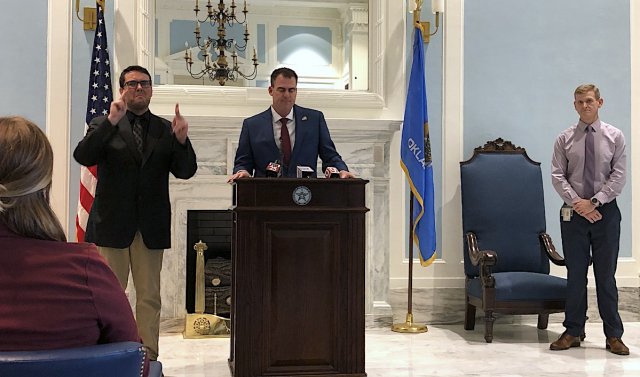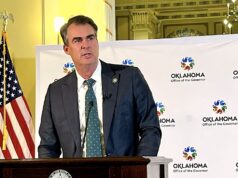
Owing to an international shortage of the reagent needed to process swabs, the Oklahoma State Department of Health is constricting its test guidelines for people experiencing symptoms potentially related to COVID-19.
“We need to go ahead and prioritize specific individuals that need to be tested for novel coronavirus,” state epidemiologist Laurence Burnsed told media this afternoon. “So we are advising our health provider partners to please prioritize those individuals that have symptoms that are consistent novel coronavirus — specifically fever, cough and shortness of breath — and fall within specific high-risk categories.”
Burnsed said those categories include:
- the severely ill
- those hospitalized, particularly in intensive care units
- elderly people with underlying medical conditions
- the immunocompromised
“We are also advising our clinical partners to prioritize those individuals who may be within groups that have had a specific outbreak,” he said, noting that health care providers experiencing symptoms are also part of the priority groups.
Oklahoma Gov. Kevin Stitt said Health Commissioner Gary Cox was in the middle of discussions with leaders of private testing labs to see if they can help Oklahoma.
“Across the state, we are critically low on our test kits. Or more specifically, the reagent,” Stitt said. “That’s the fluid that goes into making the swab positive or negative.”
Burnsed revealed that Oklahoma began the day with total capacity to process fewer than 300 swabs and that about 200 new samples had already arrived from health care providers today. With 29 COVID-19 cases confirmed, the state has tested almost 500 people so far.
He also addressed concerns that members of the Oklahoma State Senate had received tests Tuesday when it was determined a staff member had tested positive.
“Some individuals may be able to access private testing,” he said, referencing the Senate’s announcement that it had used a private enterprise.
But some private companies are also seeing a backlog in their testing capabilities, according to Burnsed.
“They are having to freeze and store specimens until those supplies become available,” he said.
‘An international shortage of the actual reagent’
Burnsed noted that the United States has experienced a series of shortages related to testing for COVID-19, commonly known as the coronavirus. Initially, he said, public health officials were dealing with a shortage of test kits produced by the federal Centers for Disease Control, which has faced criticism for creating its own kits and not accepting international versions already in production.
“Now we’re dealing with an international shortage of the actual reagent,” Burnsed said. “This is the liquid that is utilized to manually extract the virus from a patient’s specimen, which is why we have to go ahead and put in these specific priority groups.”
Stitt referenced a report this week that University of Michigan researchers are trying to develop their own COVID-19 test to address the current shortage. He said he would be asking Oklahoma’s research universities to pursue something similar if possible.
“That’s something we certainly want to get ahead of in case there are further delays on receiving this reagent,” Stitt said.
Burnsed said Oklahoma has placed a maximum re-order (500) of the testing reagents to no avail.
“We were advised that unfortunately there is no specific delivery date,” he said, adding that he could not recall the name of the companies that produce the testing reagents. It’s a very limited number of companies, unfortunately. They are just not able to maintain the demand globally.”
Nursing home resident tests positive in hospital
Wednesday, Stitt also announced the first positive COVID-19 diagnosis for a nursing home resident has been identified, although the woman was hospitalized at the time she was tested. That resident is likely to be discharged from the hospital into the care of her family and not back into the nursing home, said Steve Buck, president of Care Providers of Oklahoma, a nursing home trade association.
“This truly does represent a tremendous challenge for our state and our communities,” Buck said.
Earlier in the day, the CDC released its report about a Seattle-area nursing home that became the center of a deadly COVID-19 outbreak. The report concluded that infected employees had continued to work despite having symptoms.
“Like all health care workers, the staff at these facilities are on the absolute frontlines of the battle against COVID-19,” Buck said in a press release distributed after the press conference. “Not only are they trying to contain this outbreak, but they are doing so while helping their residents feel safe, comfortable and cared for. We owe them our gratitude for the dedication and compassion they are showing.”
That release said the infected woman had been a resident of Ponca City Nursing and Rehabilitation.
Stitt and Burnsed advised Oklahomans to follow CDC hand-washing guidelines and social distancing measures. The governor has faced criticism for his decision last weekend to tweet about eating in a crowded a restaurant with his family. During Wednesday’s press conference, Stitt emphasized the importance of supporting restaurants through making carry-out orders, something he and Buck did for lunch.
“I want to thank Oklahomans for taking this seriously,” Stitt said.





















